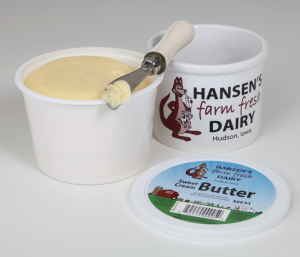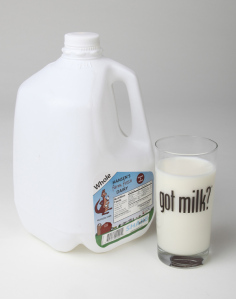The Whole Story: Are full-fat dairy products actually good for you?
August 14, 2014 10:00 pmBy Disa Cornish
 One of my favorite snacks growing up was one my dad would make. And his mom, my grandma, served it with dinner in the trailer at the lake in Okoboji. A bread and butter sandwich. With “tooth butter” – butter thick enough to leave tooth marks when you took a bite. Sometimes we’d shake things up and sprinkle a little sugar on it for fun. Or a couple of pickle slices. But bread and butter was usually enough.
One of my favorite snacks growing up was one my dad would make. And his mom, my grandma, served it with dinner in the trailer at the lake in Okoboji. A bread and butter sandwich. With “tooth butter” – butter thick enough to leave tooth marks when you took a bite. Sometimes we’d shake things up and sprinkle a little sugar on it for fun. Or a couple of pickle slices. But bread and butter was usually enough.
Then I grew up and learned about “eating healthy” and “cholesterol” and “low-fat” and other things that were part of a balanced and nutritious diet. Bread and butter sandwiches were not on the list. Nor was the 2% milk we always drank for dinner. Skim all the way.
But in the last few years I’ve heard some rumblings about fat being – gasp! – good for you. Specifically, animal fats like dairy. We’ve rounded up some research findings and medical evidence for why full-fat dairy products like butter and whole milk are actually better for you than their low-fat alternatives like margarine and skim milk.
- Some vitamins are fat soluble – they are absorbed with fat. Vitamins A, D, E, and K are all fat soluble. If you don’t eat enough fat, your body won’t be able to absorb those vitamins properly. Deficiencies in these vitamins can cause problems in the brain and the body.
 Eating higher fat dairy products may actually help you keep the pounds off. A 2013 study of men in rural Sweden found that men who didn’t eat butter and drank low-fat milk at the beginning of the study were more likely to become obese. Men who ate more whipped cream, butter, and whole milk at the beginning of the study were less likely to become obese. And, in another review of European studies, consuming dairy was linked to lower risk of obesity.
Eating higher fat dairy products may actually help you keep the pounds off. A 2013 study of men in rural Sweden found that men who didn’t eat butter and drank low-fat milk at the beginning of the study were more likely to become obese. Men who ate more whipped cream, butter, and whole milk at the beginning of the study were less likely to become obese. And, in another review of European studies, consuming dairy was linked to lower risk of obesity.- Eating margarine instead of butter may increase your risk for heart disease. All the way back in 1997, the Framingham study in Massachusetts found that people who ate margarine instead of butter had an increased chance of developing coronary heart disease over 10 years. In other words, eating margarine raised their risk of having a heart attack. People who ate butter had no change in their risk.
- Real food is better for you than fake food. The more food is processed and changed from its original form, the more important vitamins and minerals are lost. Butter and whole milk are whole foods, unchanged and left just the way nature intended.
So…think about it. If you’re a margarine person, maybe think about switching it up from time to time and adding butter to your family’s table. If you’re a skim milk person, consider drinking a glass of 1% or whole milk once in a while. But the bottom line is that you shouldn’t be afraid of a little whipped cream or butter now and then. It’s the sugar and processing that should make you stop and think!
Sources:
“Butter is Back” by Mark Bittman; published in the New York Times online on March 25, 2014. https://www.nytimes.com/2014/03/26/opinion/bittman-butter-is-back.html?_r=0
“7 Reasons Why Butter is Good for You” by Kris Gunnars; published online at https://authoritynutrition.com/7-reasons-why-butter-is-good-for-you/
“A Different Kind of Love: Fat and Me” by Jennifer McLagan; published online at https://leitesculinaria.com/66559/writings-why-animal-fat-is-good.html
“The Full-Fat Paradox: Whole Milk May Keep Us Lean” by Allison Aubrey; February 12, 2014 story on National Public Radio online at https://www.npr.org/blogs/thesalt/2014/02/12/275376259/the-full-fat-paradox-whole-milk-may-keep-us-lean


